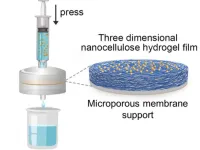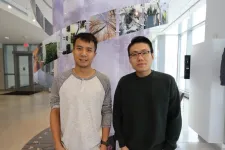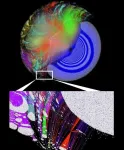(Press-News.org) More than 2 billion people, approximately a quarter of the world’s population, lack access to clean drinking water. A new, portable and affordable water filtration solution created by researchers at The University of Texas at Austin aims to change that.
The new system collects dirty water with a syringe and injects it into a hydrogel filter that weeds out nearly all tiny particles. This device, the researchers say, offers significant advantages in cost, simplicity, effectiveness and sustainability compared existing commercial options, giving users the ability to easily decontaminate water from nearby streams and rivers and make it drinkable.
“The pressing concern of particle-polluted water, particularly in remote and underdeveloped regions where people frequently rely on contaminated water sources for consumption, demands immediate attention and recognition,” said Guihua Yu, a professor of materials science at the Cockrell School of Engineer’s Walker Department of Mechanical Engineering and Texas Materials Institute. “Our system, with its high efficiency in removing diverse types of particles, offers an attractive yet practical solution in improving freshwater availability.”
The research was published recently in Nature Sustainability.
Today’s options for portable water filtration of tiny particles mostly consist of filter paper and microporous membranes. According to the research, these devices filter out roughly 40% and 80% of particles larger than 10 nanometers, respectively. This new system catches close to 100% of these particles.
And it is made of low-cost, sustainable, readily available materials. The main innovation is an intertwined web of nanocellulose fibers that catches particles while the newly cleaned water passes through.
All the user has to do is take the syringe to the nearest water source, pull out the water and inject it through the filter. The system takes care of the rest, spitting out clean, drinkable water.
The filter system has been tested with several types of water sources, including muddy water, river water and water contaminated with microplastics. The hydrogel films are biodegradable and can be used up to 30 times before they need to be replaced.
The research team has tested the technology using syringes as large as 1.5 liters, about 40% of an individual’s daily drinking water needs. And they plan to continue developing the technology to use it at larger scales to tackle global drinking water needs.
The researchers were motivated by one of the United Nations’ Sustainable Development Goals to improve drinking water standards and sanitation worldwide. Meeting this goal, according to the U.N., will require a 6X increase in drinking water availability by 2030.
“The reality is, a large percentage of the world’s population lacks access to safe drinking water, even in places where fresh water sources are available,” said Chuxin Lei, lead author and a graduate student working in Yu’s lab, said. “There is an urgent need for simple, universal, and efficient materials and devices for purifying particle-contaminated water, which should be able to help people around the world obtain clean water.”
Team members on the project also include collaborators from Northeast Forestry University, Shanghai Tech University and Tsinghua University in China.
END
Injectable water filtration system could improve access to clean drinking water around the world
2024-01-23
ELSE PRESS RELEASES FROM THIS DATE:
Gravity helps show strong force strength in the proton
2024-01-23
The power of gravity is writ large across our visible universe. It can be seen in the lock step of moons as they circle planets; in wandering comets pulled off-course by massive stars; and in the swirl of gigantic galaxies. These awesome displays showcase gravity’s influence at the largest scales of matter. Now, nuclear physicists are discovering that gravity also has much to offer at matter’s smallest scales.
New research conducted by nuclear physicists at the U.S. Department of Energy’s Thomas Jefferson National Accelerator Facility is using a method that connects theories of gravitation to interactions among the smallest ...
Cleveland Clinic and IBM Researchers publish findings on artificial intelligence and immunity
2024-01-23
Researchers from Cleveland Clinic and IBM have published a strategy for identifying new targets for immunotherapy through artificial intelligence (AI). This is the first peer-reviewed publication from the two organizations’ Discovery Accelerator partnership, designed to advance research in healthcare and life sciences.
The team worked together to develop supervised and unsupervised AI to reveal the molecular characteristics of peptide antigens, small pieces of protein molecules immune cells use to recognize threats. Project members ...
When some adolescent girls internalize rejection, it really is in their head
2024-01-23
Everyone ruminates about the bad things that happen to them. Whether it’s a nasty breakup, an embarrassing failure or simply when someone is mean, it can be hard to stop thinking about what happened and why. For people who ruminate too much, this negative thought pattern can cause lasting problems with mental health.
A research team led from the University of California, Davis, Center for Mind and Brain found that adolescent girls who have a stronger tendency to ruminate show different patterns of brain activity when faced with social rejection. The study was ...
Researchers design new open-source technology for interfacing with living neurons
2024-01-23
Neurons intricately communicate and respond to stimuli within a vast network, orchestrating essential functions from basic bodily processes to complex thoughts. Traditional neuroscience methods, relying on in vivo electrophysiology (within a living organism), often have difficulty addressing the complexity of the brain as a whole. An alternative approach involves extracting cells from the organism and conducting studies on a culture dish instead (in vitro), providing researchers with enhanced control and precision in measuring neural processes. In a new study featured in Advanced Science, researchers unveil a cost-effective, open-source in vitro system ...
Why do young women with multiple sclerosis face health disparities?
2024-01-23
While recent therapies have the potential to stall or delay the progression of multiple sclerosis, a new study shows that young Black and Hispanic women fare worse than young white women.
Minority women were more likely to have more advanced disease and faced greater challenges in pregnancy, the researchers reported in their study, publishing in the journal Neurology on Jan. 23, 2024.
Researchers tracked medical records at nine MS centers throughout the country for 294 women whose pregnancies resulted in live births. Approximately half of the patients ...
Could two drugs be better than one for treating prostate cancer?
2024-01-23
Combining testosterone-blocking drugs in patients with prostate cancer relapse prevents the spread of cancer better than treatment with a single drug, a multi-institution, Phase 3 clinical trial led by UC San Francisco researchers has found.
The approach can extend the time between debilitating drug treatments without prolonging the time it takes to recover from each treatment.
Prostate cancer affects 1 in 8 men and causes 34,000 deaths each year in the United States. It is usually treated with one of several testosterone-lowering drugs for a set period of ...
Predicting and controlling bad-actor AI activity in a year of global elections
2024-01-23
MEDIA CONTACT:
Cate Douglass; cdouglass@gwu.edu
More than 50 countries are set to hold national elections this year and analysts have long sounded the alarm on the threat of bad actors using artificial intelligence (AI) to disseminate and amplify disinformation during the election season across the globe.
Now, a new study led by researchers at the George Washington University predicts that daily, bad-actor AI activity is going to escalate by mid-2024, increasing the threat that it could affect election results. The research, published today in the journal PNAS Nexus, is the first quantitative scientific ...
When lab-trained AI meets the real world, ‘mistakes can happen’
2024-01-23
First study to examine the impact of tissue contamination on AI models
‘If it’s paying attention to the tissue contaminants, it’s paying less attention to the patient’s tissue that is being examined’
‘Pathologists fear — and AI companies hope — that the computers are coming for our jobs. Not yet.’
Human pathologists are extensively trained to detect when tissue samples from one patient mistakenly end up on another patient’s microscope slides ...
Systematic analysis of the prognostic value and immunological function of LTBR in cancer
2024-01-23
“[...] we identified LTBR as a potential target for cancer immunotherapy and a marker of immune infiltration and poor prognosis.”
A new research paper was published in Aging (listed by MEDLINE/PubMed as "Aging (Albany NY)" and "Aging-US" by Web of Science) Volume 16, Issue 1, entitled, “Systematic analysis of the prognostic value and immunological function of LTBR in human cancer.”
Lymphotoxin beta receptor (LTBR) is a positive T cell proliferation regulator gene. It is closely associated with the tumor immune microenvironment. However, its role in cancer and ...
CUNY SPH Foundation expands Molina Health Equity Scholarship Fund with endowment
2024-01-23
The CUNY Graduate School of Public Health and Health Policy (CUNY SPH) has announced an expansion and endowment of the Molina Health Equity Scholarship Fund as a groundbreaking and permanent source of support for students dedicated to advancing health equity in underserved Hispanic and Latino communities.
Established by Dr. Marilyn Aguirre-Molina, CUNY SPH professor emerita and CUNY SPH Foundation Board member, and distinguished academician Dr. Carlos W. Molina, the Molina Health Equity Scholarship Fund now becomes the first named and endowed master’s degree scholarship in the school’s ...




